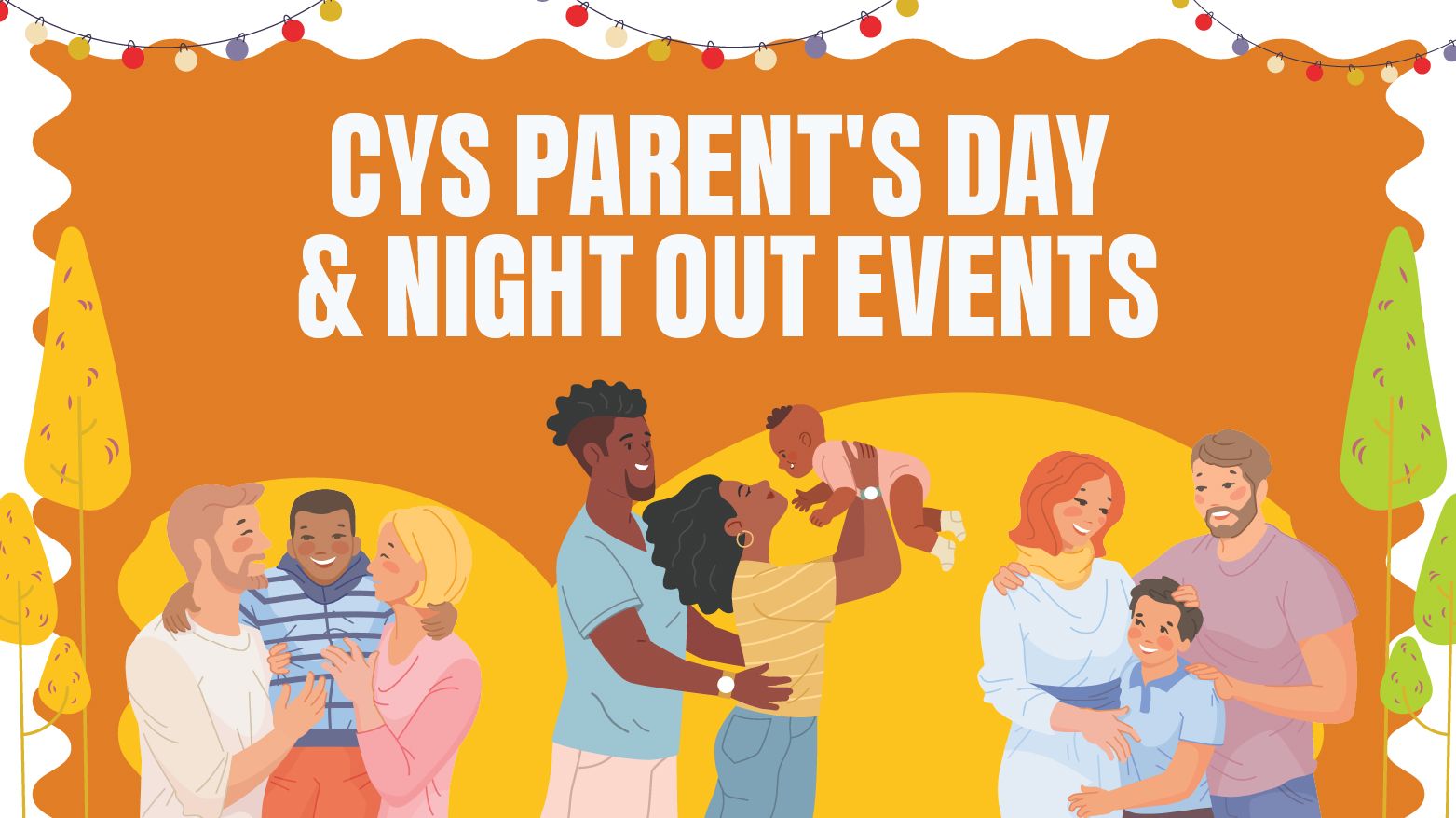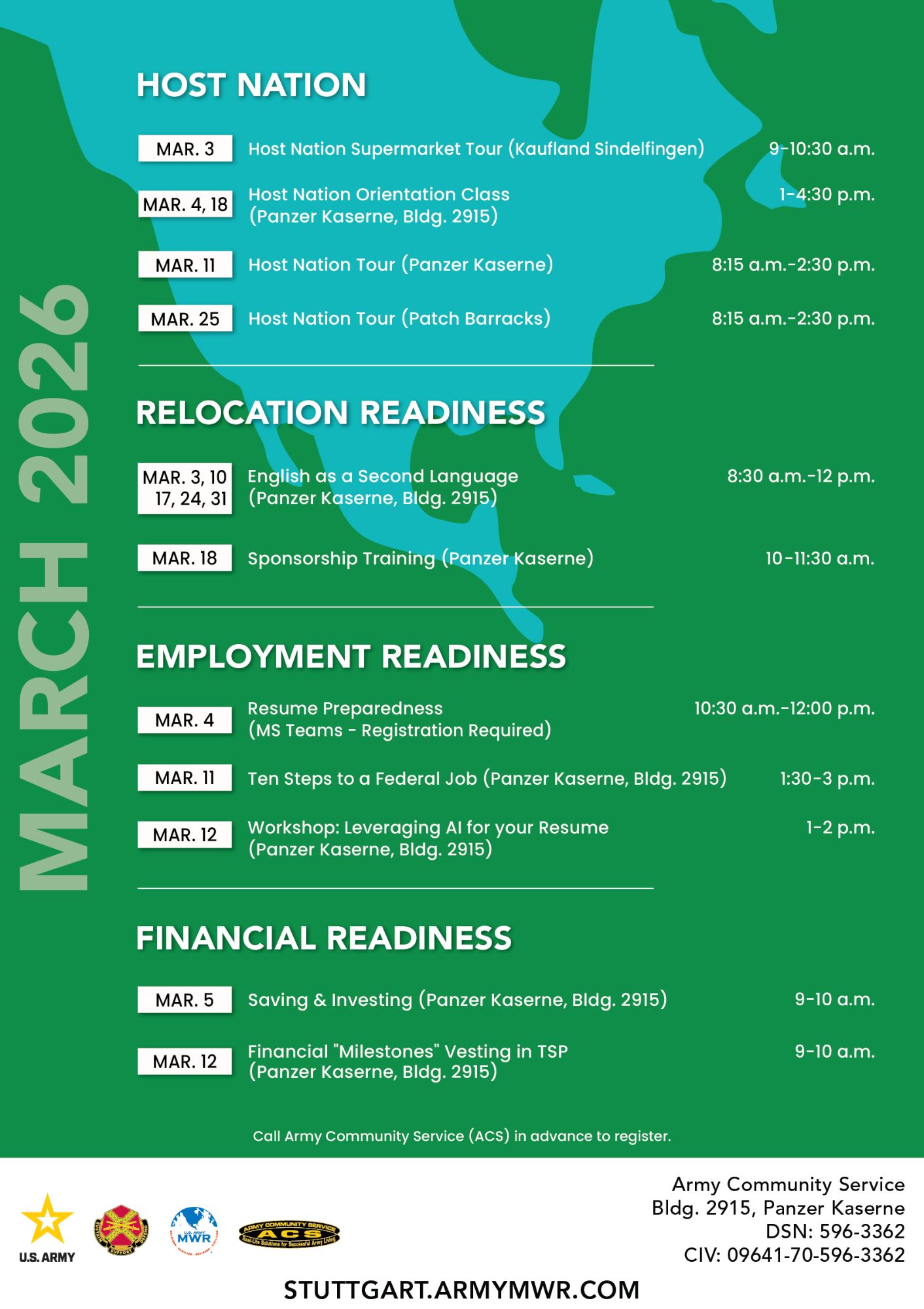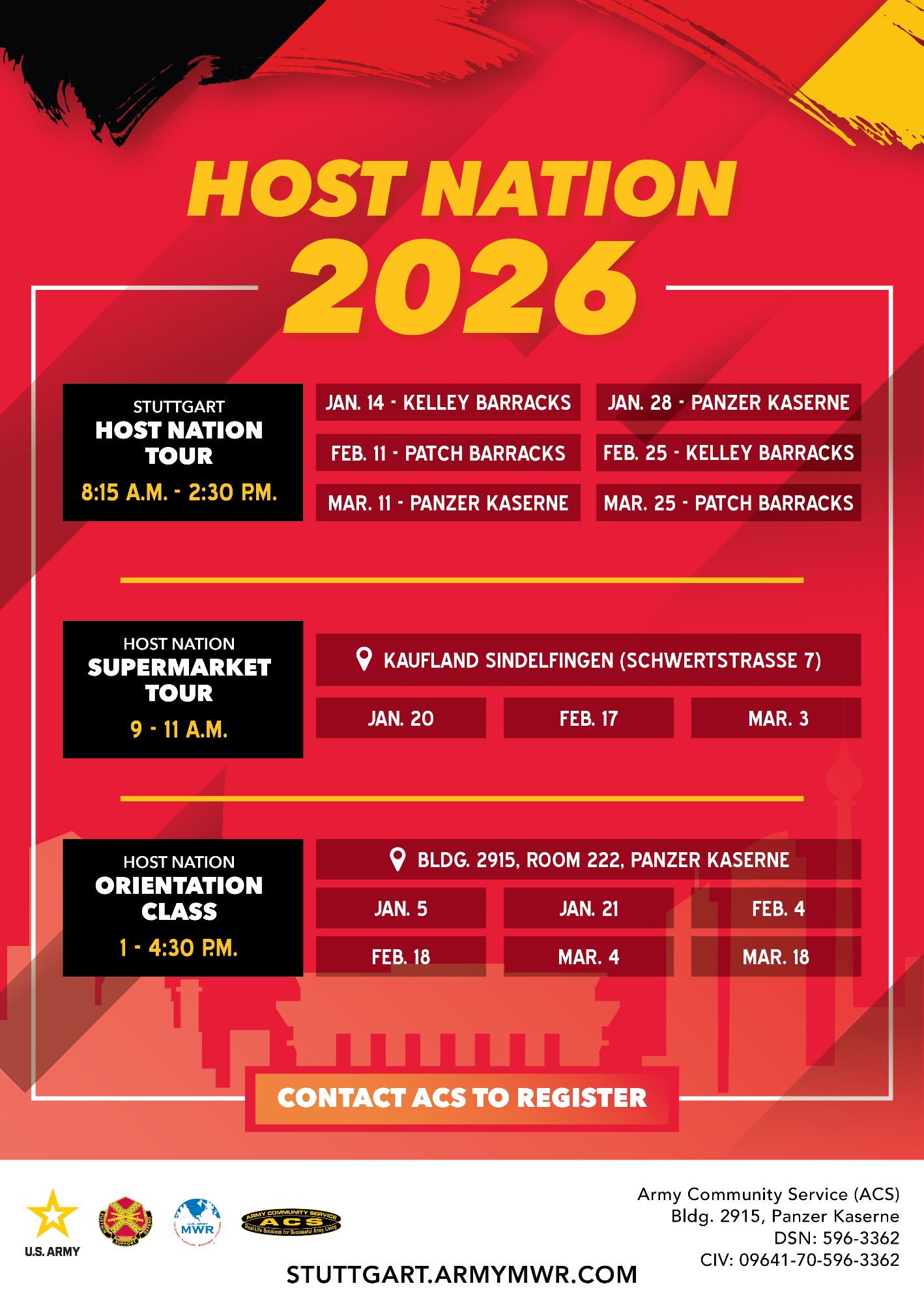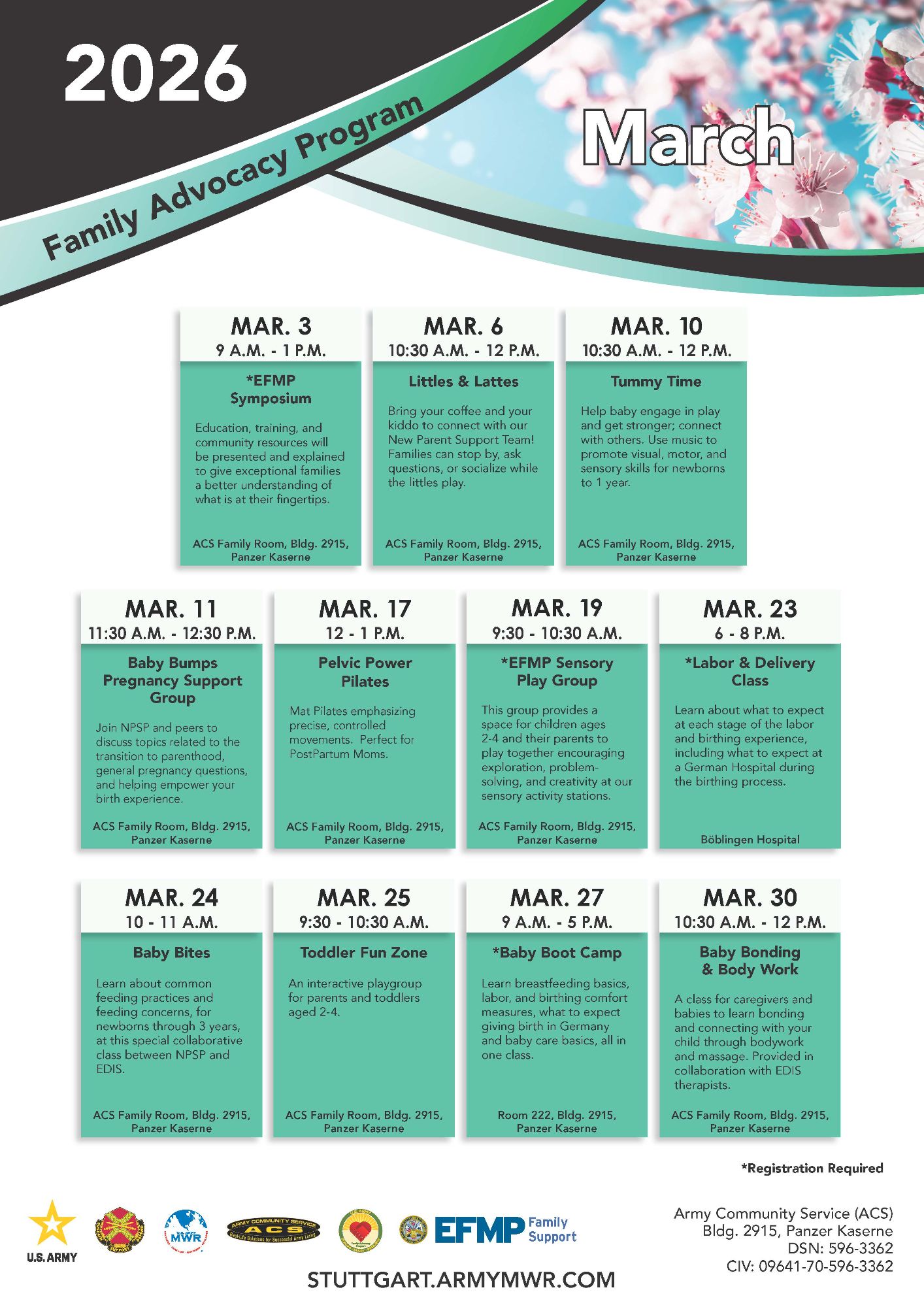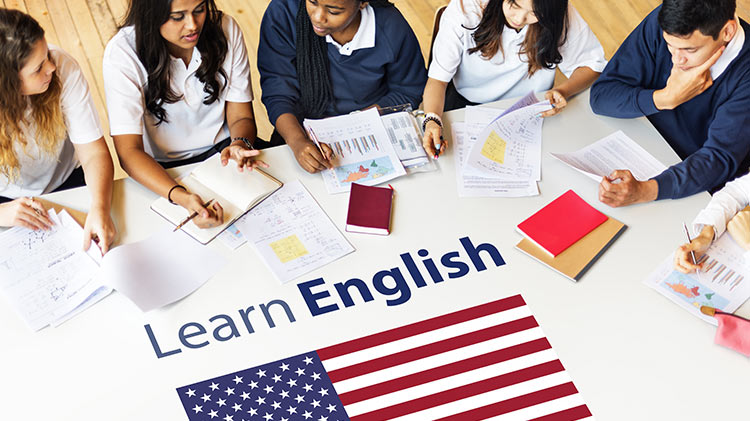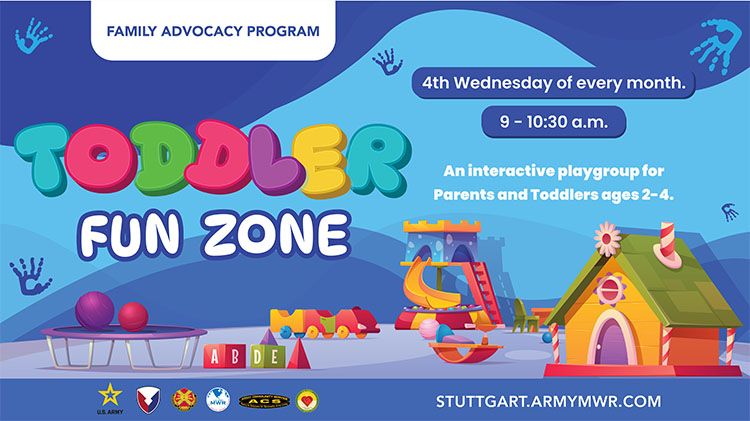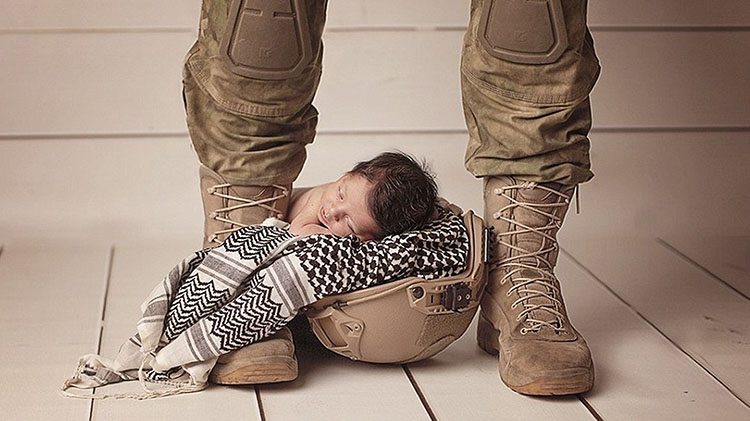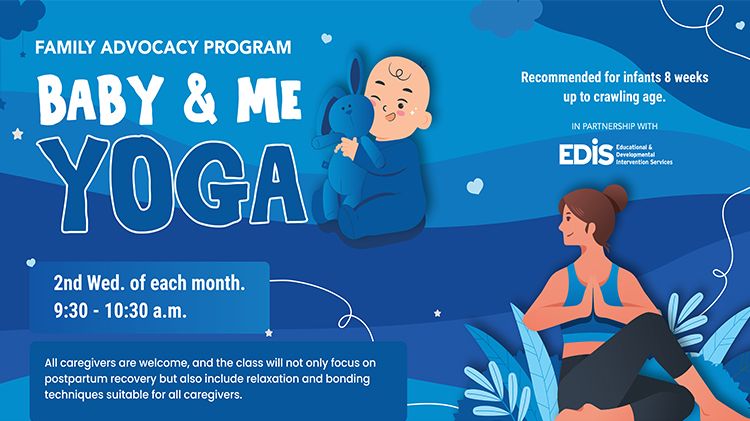- Frequently Asked Questions
-
1. Are there individual and/or group counseling available?
Army Community Service does not offer counseling services. However, Behavioral Health, the Chaplain at the Family Life Center, as well as the Military and Family Life Consultants provide individual counseling. Group counseling is available through the Army Substance Abuse Program in the form of Alcoholics Anonymous, however, no other group counseling is offered
2. Where can I find the phone numbers?
The phone number for Army Community Service (ACS) can be found on the ACS page of the Stuttgart Family and MWR Web site, http://stuttgart.armymwr.com/europe/stuttgart/programs/army-community-service/. For programs and services at USAG Stuttgart, phone numbers are located on the USAG Stuttgart Web site, in the Community Resource Guide, located at http://www.stuttgart.army.mil/pdf/CommunityResourceGuide.pdf. USAG Stuttgart also has a Phone Directory located online at http://www.stuttgart.army.mil/phonebook.html. USAG Stuttgart directory assistance, the operator, may be reached by calling DSN 113 or Commercial +49 (0)711-680-113.
3. What are the signs of child abuse and neglect?
Some of the more common signs of child abuse and neglect are:
- Behavior changes such as fear, anxiety, depression, aggression or withdrawal, not wanting to go home, or appearing afraid of certain individuals
- Overly sexualized behavior or use of explicit sexual language that's inappropriate for the child's age
- Changes in sleeping patterns including frequent nightmares, difficulty falling asleep. Both may result in the child appearing tired or fatigued
- Changes in school performance and attendance, such as being unable to concentrate in class or frequent absences
- Eating habits that lead to extreme weight gain or loss
- Visible unexplained injuries such as burns, bruises, or broken bones
- Use of drugs or alcohol
- Trouble walking or sitting
4. What are the signs of domestic abuse?
Some of the more common signs of domestic abuse are:
- Partner accuses you of cheating and being disloyal
- Partner makes you feel worthless
- Partner hurts you by hitting, choking or kicking you
- Partner intimidates and threatens to hurt you or someone you love
- Partner threatens to hurt themselves if they don’t get what they want
- Partner tries to control what you do and who you see
- Partner isolates you
- Partner pressures or forces you into unwanted sex
- Partner controls your access to money
- Partner stalks you, including calling you constantly or following you
5. Do I have to enroll my family member in EFMP?
Yes, EFMP is a mandatory enrollment program for Service Members and their families. The Army Community Service EFMP Family Support Office services/resources are, however, voluntary.
6. What jobs are available?
There are over 33 government contracting firms offering various positions on the installation. These positions can range from administrative, medical, academia, counseling, information technology (IT), banking, business, planning and operations, management, engineering, logistics to marketing. There are a variety of federal jobs available in the Stuttgart area ranging from administrative and teaching positions to working at the Commissary, CYSS, Plans and Operations, Program Managers, Engineers, Maintenance Workers, IT, Logistics, and Finance. Positions vary, so it is important to check www.usajobs.gov for the latest opportunities.
7. What classes are available?
USAG Stuttgart Army Community Service (ACS) offers a variety of classes on topics to include employment and career development, personal financial readiness and consumer affairs, marriage and family enrichment, parenting, domestic violence and child abuse prevention, managing emotions, family readiness, sponsorship and spouse sponsorship, resilience, English as a Second Language, German language and culture, volunteerism, and personal and professional growth. ACS class offerings can be found on the Stuttgart Family and MWR Calendar at www.stuttgart.armymwr.com, and hard copies of class listings are available at ACS.
8. Are there AA classes?
The Army Substance Abuse Program (ASAP) maintains a list of English-speaking open and closed Alcoholics Anonymous (AA) meetings, to include dates and times, in the Stuttgart area. The link to the ASAP Web site with meeting times and locations, available for download, is https://home.army.mil/stuttgart/index.php/my-garrison/all-services/army-substance-abuse-program. ASAP may be reached at DSN 431-2530/2835 or Commercial +49 (0)7031-15-2530 or +49 (0)7031-15-2835 for additional information on AA.
9. What kind of support programs are available?
Army Community Service support programs include the Family Advocacy Program which includes the New Parent Support Program for new parents and parents to be and Domestic Violence Victim Advocate, and the Exceptional Family Member Program supporting individuals and families with special needs. The USAG Stuttgart Community Resource Guide, located at http://www.stuttgart.army.mil/pdf/CommunityResourceGuide.pdf, also provides information on support programs addressing a variety of concerns such as alcohol and substance abuse, health and wellness to include tobacco cessation and nutrition, sexual harassment and assault, grief and loss, marriage and family difficulties, and parenting concerns.
10. Is the lending closet only for Service Members and their families?
No, the lending closet is open to all personnel who are ID cardholders and are in or out-processing and can provide a copy of their PCS orders.
11. Can ACS provide services to any Service Member of any military branch?
Yes. USAG Stuttgart is a purple community and ACS can provide services to all military Service Members.
12. Can children attend the Host Nation Orientation?
Only children 13 years and older are allowed to attend HNO.
13. Can AER provide assistance for initial rent and deposit during PCS move?
Yes, AER can assist qualified individuals with initial rent and deposit upon arriving to their new duty station.
14. Does the financial readiness program provide information on the new retirement plan?
Yes, the financial readiness program offers classes or one-on-one counseling on the military's blended retiremen
15. Who is eligible for SHARP services?
The SHARP office provides services for adults who have experienced a sexual crime by a person other than a spouse, domestic partner or individual with whom the affected person shares a child. Military personnel and adults who are 18 years and older are eligible for a full range of SHARP services. Other services and referral are available for DoD civilians, contractors and local nationals.
16. Who is allowed to use NPSP services?
Anyone with base access is allowed to use our services, this includes Service Members, Civilians, such as GS, DOD, and Family Members.
17. Do I need to in -process EFMP if I am not a Soldier?
If you have an Exceptional Family Member (someone enrolled into EFMP) in your household, you must in-process through ACS EFMP, no matter branch of service.
18. Can EFMP help my child who is receiving special education services?If you are looking for resources, family support programs or special education guidance/ support that includes assistance with IEP's and 504 plans, the USAG Stuttgart Systems Navigator is here to help.
19. Is there a service to assist spouses and family members to find employment while stationed in Stuttgart?
Yes. ERP can assist military spouses as well as civilian spouses to update their resumes, navigate USAJOBS and be added to an email distribution roster when employment opportunities are announced.
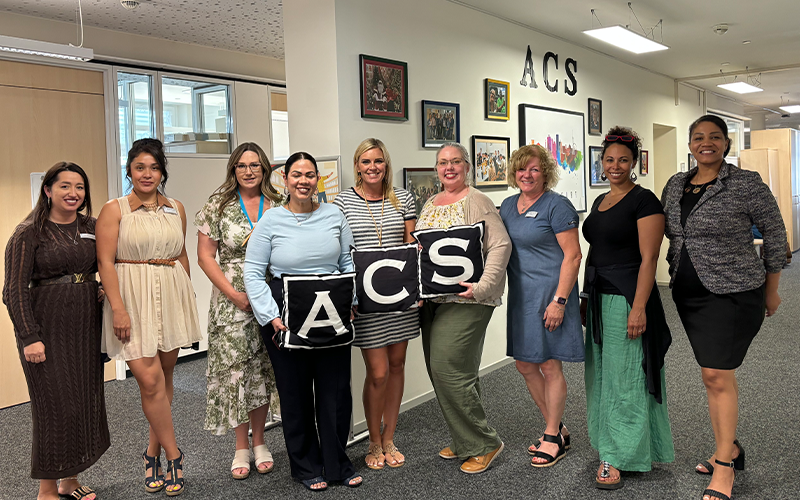
Check USAG Stuttgart ACS out on Facebook!
Army in Europe Child and Youth Supervision Policy
USAG Stuttgart Child Supervision Policy Quick Reference Chart.
From Family readiness to financial health—and much more— Army Community Services (ACS) delivers programs tailored to your needs. We help maintain community readiness and resiliency through a wide range of educational opportunities, special events, individualized counseling services, and other offerings.
We help Soldiers from their first assignments all the way to separation or retirement, as well as Families, veterans, wounded warriors, survivors, and retirees. ACS supports the entire Army community.
Learn more about what ACS offers at your installation!
ACS values your privacy and security. Learn more about ACS customers' rights and responsibilities.
* Not all programs are available at all garrisons.

